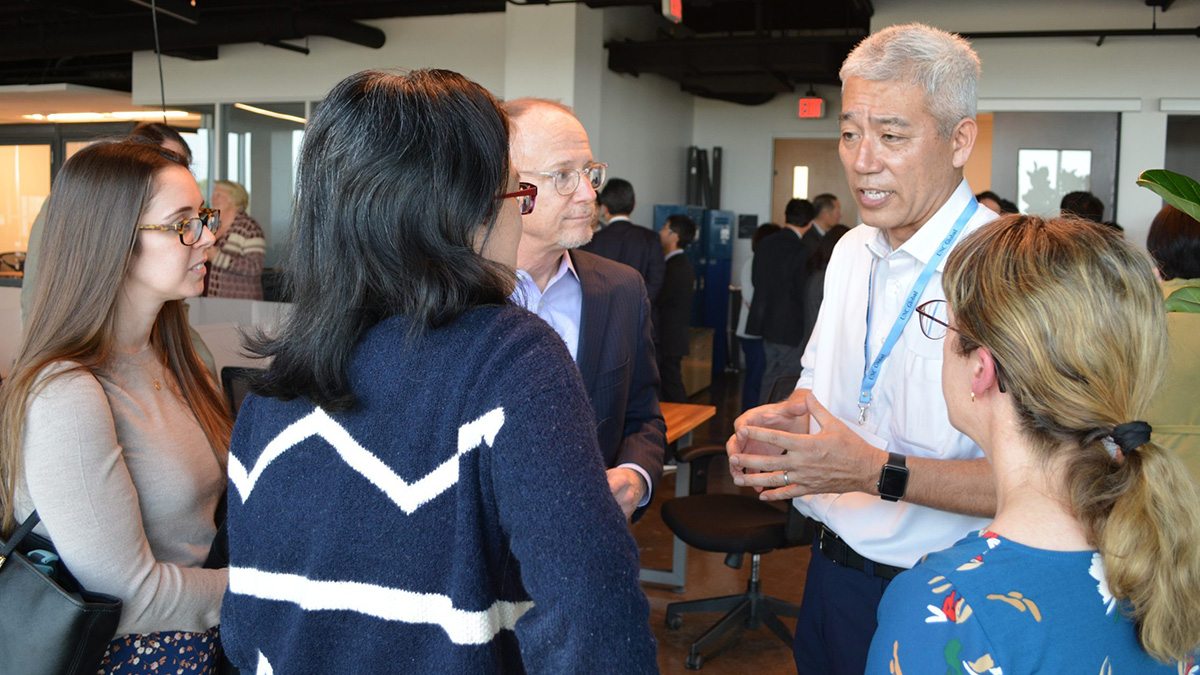Carolina shares entrepreneurial teaching and innovation with Japanese universities
Visiting participants were introduced to Innovate Carolina and Launch Chapel Hill, as well as Carolina Angels Network, an investing platform that supports the Carolina startup community with funding and advice from experienced alumni.

Research administrators and faculty from four Japanese universities visited UNC-Chapel Hill last month to learn how Carolina teaches and supports entrepreneurship and innovation. The program engaged more than 150 students, 35 faculty and staff, and eight local government and business officials.
Carolina’s Office of the Vice Provost for Global Affairs and Nagoya University organized the delegation, which included representatives from Fujita Health University, Meijo University and Aichi University of the Arts, all universities in the Tokai Higher Education and Research System. Carolina and Nagoya have a partnership that spans three decades, involving joint research and student exchange.
“UNC is famous as a leading public research university with an exceptional entrepreneurship ecosystem, where various new innovations are burgeoning recently,” said Tomohisa Koyama, co-organizer of the visit and executive director of NU Tech, a nonprofit that promotes technology transfer between Nagoya University and U.S. companies. “Nagoya University researchers and instructors wanted to experience and learn about the environment and ecosystem at Carolina.”
Tim Rose, associate director for exchange and sponsored programs in the OVPGA, led the planning of the program for UNC-Chapel Hill in close collaboration with Tim Flood, associate professor at Kenan-Flagler Business School and executive director of Launch Chapel Hill. Visiting participants were introduced to Innovate Carolina and Launch Chapel Hill, as well as Carolina Angels Network, an investing platform that supports the Carolina startup community with funding and advice from experienced alumni.
As part of a visit to BeAM@CAROLINA, a network of four makerspaces, student staff members demonstrated how innovators can access 3D printing, sewing machines and wood and metalworking tools to make prototypes and new products.
Christopher Nguyen, a senior biomedical and health sciences engineering major and BeAM program assistant, presented a project he made at the makerspace, a 3D-printed acrylic image stand.
“It was a great experience presenting to an international audience,” said Nguyen. “It felt less like a presentation and more like a conversation, where we got to learn more about them and share about ourselves.”
Chris Mumford, professor of the practice in entrepreneurship, hosted the participants in a course he teaches as part of the Shuford Program in Entrepreneurship in the College of Arts and Sciences. Shuford students study the theory and practice of entrepreneurship through an academic minor, internships and study abroad. For students, meeting with an international audience is a great way to develop the context necessary for complex problem-solving and design thinking, according to Mumford.
NU Tech’s Koyama believes the visit covered important elements that the Japanese participants will apply at their home institutions.
“I am sure the participants will use the experience and knowledge that they gained through the program to develop better educational programs for entrepreneurship at their universities,” said Koyama. “Since the tie between UNC and Nagoya University is very strong, we expect more collaborations between the two institutions in student and faculty exchange, research collaboration and more in the near future.”
The visit touched on a number of UNC-Chapel Hill’s priorities outlined in its strategic plan, Carolina Next: Innovations for Public Good, like strengthening global partnerships and bringing the world to Carolina.
“By hosting international exchange groups like the one from Nagoya, we are exposing them to the vast expertise of Carolina faculty and strengthening Carolina’s global brand and reputation,” said Rose.
Entrepreneurship that serves to benefit society is another priority for UNC-Chapel Hill. There are more than 500 Carolina-affiliated startups, and more than 8,500 North Carolina jobs created by these startups, many of which are addressing global challenges. The Institute for Convergent Science, for example, provides Carolina faculty and students with entrepreneurial tools to bring their ideas from research labs to the market to address issues like water sanitation.
Though the visitors came to learn about UNC-Chapel Hill’s entrepreneurship curriculum and programming, they also spent time learning about North Carolina, where Japan is a major economic partner. The country is North Carolina’s third largest international investor, and there are 80 Japanese-majority owned companies in the state that provide more than 27,000 jobs.




